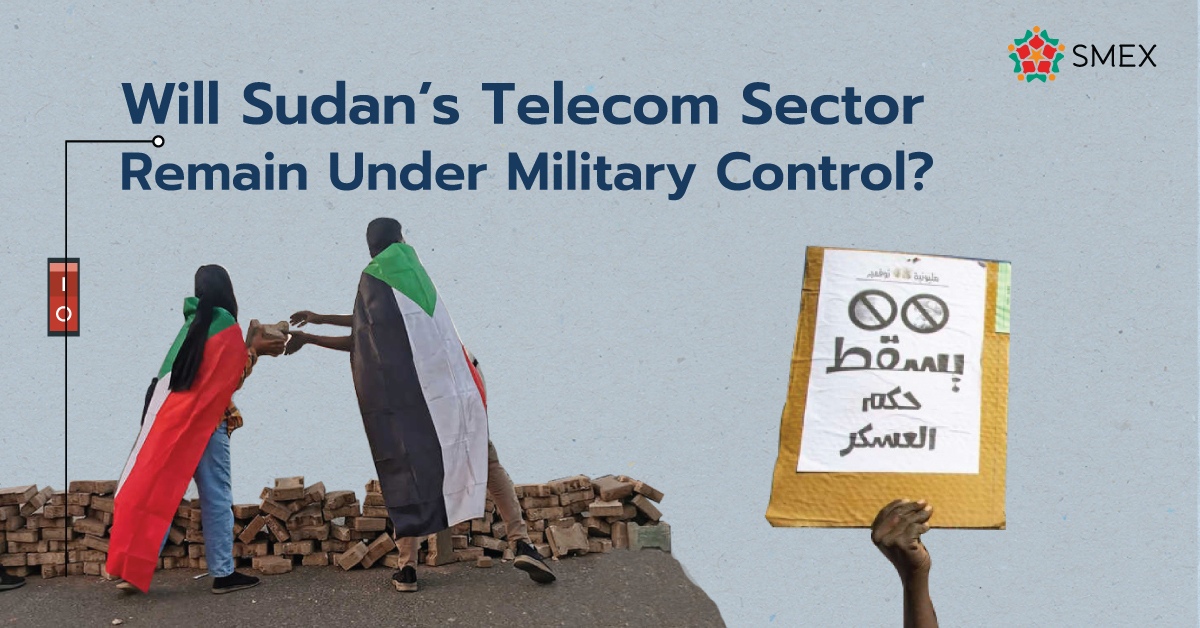On May 29, Sudan’s military leader, General Abdel Fattah Al-Burhan, lifted the nationwide state of emergency, setting the stage for talks between conflicting parties. However, the end of the emergency period coincided with military crackdowns and arrests against protesters. The army has imposed its control over the freedom of expression and the country’s most dynamic sectors, including the telecommunications sector.
Al-Burhan’s decree to lift the state of emergency came after over seven months since the October 25 military coup. The state of emergency placed the Communications and Postal Regulatory Agency under the control of the 2019 Sovereignty Council which excluded the resistance bloc demanding a return to civilian rule.
As a result, telecommunications became subject to the decisions of the military. In November 2021, the Director-General of the Agency, Major General Al-Sadiq Jamal Al-Din, rejected a judicial order to restore the internet. Jamal Al-Din justified his actions by saying that the denial-of-service occured due to a “sovereign order” and under the “state of emergency declaration.” Moreover, he claimed it was to “protect national security,” which had been compromised at that time.
The October 25 Coup: New Digital Abuses
The post-coup period witnessed violations that went beyond denying millions of Sudanese people their right to the internet and their freedom of expression, to encompass privacy violations and surveillance of their personal phones.
The “Emergency Lawyers Committee” that provides legal aid and monitors human rights violations after the October 25 coup revealed to SMEX that the authorities “were monitoring the cell phones of many activists and politicians who had been arrested earlier.” As reported in their notarized affidavits, the committee added that “authorities tracked personal cell phones and subpoenaed all of [the protestors’] phone records during interrogation.”
Regarding telecommunications companies’ procedure to shut down the internet, the “Emergency Lawyers Committee” stated that it is based on a judicial decision. Implementing this order proved that all the Sudanese telecommunications companies breached their contracts with their subscribers. The head of the Consumer Protection Association in Sudan, Yasser Mirghani, confirmed the breach, emphasizing consumers’ right to reclaim compensation according to the size of the damage caused by the service ban.
On the other hand, a source in the office of the Minister of Communications, Hashem Hassab Al-Rasoul, revealed to SMEX that the October 25 decisions led to the suspension of a large number of projects aimed at developing the telecommunications sector and facilitating the digital transformation in the country.
He explained that these projects “would have contributed towards the sustainability of the telecommunications sector in the war-affected areas and the production and mining areas, as well as the improvement of its overall infrastructure.” Further, he estimated their value at more than one billion dollars that Sudan obtained from various international bodies, including the International Development Association (IDA) and the African Development Bank, in addition to donor countries.
The source also confirmed that political and economic instability in Sudan has led many competent Sudanese to flee when they could have stayed and contributed to accomplishing these projects and developing the information and telecommunications sector.
The latter’s massive financial rewards, which include the independent “Universal Service Fund,” where an annual percentage of the profits of telecom companies in Sudan are deposited, might be “one of the reasons for the military’s move to control the telecommunications sector, in addition to the possibility of collecting a lot of data from telecommunications.”
The future of telecommunications in case the military and civilians reach a settlement
On June 8, a direct dialogue to find solutions for the crisis was launched between the rivaling political parties under the auspices of the tripartite mechanism that includes the UN Integrated Transition Assistance Mission in Sudan (UNITAMS), the Intergovernmental Authority on Development (IGAD) and the African Union.
In addition, KSA and the US took an initiative for a bilateral meeting between the Central Council of the Forces for Freedom and Change-Central Council (FFC-CC) and the military component. The Forces for Freedom and Change, which represent a considerable portion of the civilian component, demanded an end of the coup, the founding of a full civil authority, and distancing the military institution from political involvement in ruling the country.
These demands may give the executive authority responsible for supervising the telecommunications sector more independence, allowing the sector a return to normalcy under the management of a new government. However, the results of these negotiations remain absent since the military remains in power. The latter re-blocked the internet again on the 30th of June during the uprising anniversary where eight people were killed, according to Reuters.
Since the signing of the agreement between the civilian and military components on the constitutional document in August 2019, “the military encroached on many powers and state institutions,” according to former Sovereign Council member Ms. Aisha Musa Al-Saeed during her resignation in May 2021. After the October 25 coup, the statement of the “FFC Central Council” in December last year, confirmed that “civilians failed to stop this incursion, which increased the military’s control over the reins of affairs.”
The repeated attempts to subjugate the companies controlled by the Sudanese army, and efforts to include them in the Ministry of Finance during the last transitional period, also show that any attempt to restore the partnership in power may lead to overt or covert settlements that prevent the independence of some state agencies.
Many had been promoting this idea including the former Minister of Finance, Ibrahim Al-Badawi, who was among the crew of the first government of the Sudanese revolution. Al-Badawi believes that there should be a settlement regarding the companies controlled by the army, as he mentioned in a previous interview.
Against this background, the future of the military-controlled telecommunications sector in Sudan remains ambiguous until the political crisis comes to an end.



